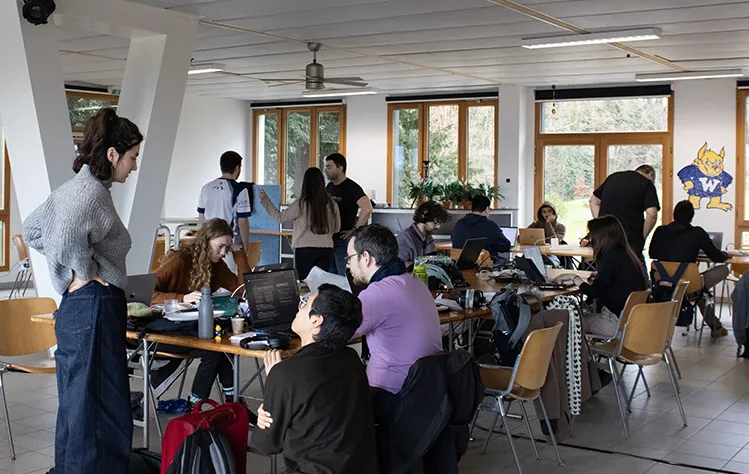At Webster Geneva, we offer flexible graduate programs for working professionals seeking to continue their education. Most master’s courses are available on evenings and weekends, allowing for students to balance their studies with work and home life, all while living in the heart of Europe.
Students graduating from the MA in Counseling will also benefit from access to Swiss Association for Counseling (SGfB) accreditation, a credential required to practice in Switzerland.

Graduate-Level Degree and Certificate Offerings
Master Degrees
- Master of Business Administration (MBA)
- Counseling with an Emphasis in Community Counseling (MA)
- Cybersecurity Operations (MS)
- Gestion des Systèmes de Soins et de Santé (MA ) Health Care Management (in French)
- Management and Leadership (MA)
Graduate Certificates
- Certificate en Leadership et Gestion dans le domaine de la santé (in French) - Graduate Certificate in Healthcare Leadership
Alumni Testimonial - Mimi Partha Sarathy
Alumni Testimonial - Mimi Partha Sarathy
Mimi Partha Sarathy holds a bachelor’s in Cost Accounting from Webster Geneva, where she also graduated in 1991 with a double master’s degree in Finance and Marketing, specializing in Financial Planning and Advisory.
Sarathy currently owns and operates a personalized investment management company, as well as a wellness center specializing in the practice and education of yoga to more than 200 students.
Transcript
[Instrumental music starts and plays in background softly.]
Text on screen: Webster Geneva Campus logo, Alumni Testimonials
[Webster Geneva campus, trees and city from the air.]
Text on screen: Mimi Partha Sarathy
[Sarathy sits at a long table.]
Sarathy: Namaste! It's so wonderful to be here at Webster Geneva. My name is Mimi Partha Sarathy. I graduated from Webster in 1991. I did my double master’s in Finance and Marketing, and my cost accounting degree from here. I live in Bangalore, in India, and run two businesses. My first business is Sinhasi Consultants Private Limited, a personalized investment management company where we manage investments, do financial planning for high-net-worth individuals in India. I set up this company in 2005, and we celebrate 20 years next year, which I’m really excited about it. We provide holistic financial planning, who cover the entire spectrum of financial management and investment management.
My second passion is my other company, Krishna Wellness Yoga Center. Coming from a family of the arts and who are patrons of the arts and culture, and I myself am a Bharatanatyam classical dancer from the age of 8 — it naturally lent itself into connecting to something culturally oriented. Yoga, along with dance, has always been special to me. I set up Krishna Wellness Yoga Center in 2014, 10 years ago. And today, we have over 200 students who come and learn yoga from me in my yoga center in Bangalore. We also run the diploma of yoga from KYM, which is the number one yoga school in our country in association with them. We're on our batch six, taking 28–30 students every 15 months, and it’s been the greatest journey.
My businesses combine wealth and wellness and without one the other cannot exist. You could have all the money in the world, but if you’re not healthy physically, emotionally and mentally, it may not have that much value. At the same time, you have all the health in the world and you don’t have money so that may also not be bring happiness to someone. So I am very privileged and honored to be part of founding and driving two companies that integrate wealth management space and the wellness space. That’s what I do in Bangalore, in India.
Text on screen: What was your most memorable experience?
[Webster Geneva campus buildings in the background.]
Sarathy: I was at Webster from January 1989 to 1991 until the time I graduated. My late father, who passed away in 2013, was one of the directors of the IUCN Education Commission in Gland, in Switzerland. Coming from an Indian family, my parents were very clear they would only send me to Geneva to study because my dad was coming here often. to Geneva and he researched and found Webster for me. He was so, so happy when he came here for the first time, which had this old building as the campus, and it was like a family. Webster for him was like a family. What better place for my daughter to be educated than at Webster?
And therefore, I was here, I did my bachelor’s in Cost Accounting, and then did my double master’s in Finance and Marketing. And I did very well. I also got certified as one of the top, best America school students in Who’s Who Among American Universities and Colleges, which is a certificate I proudly hang up in my office, even today.
Text on screen: How Webster helped you build your career?
[Webster Geneva campus buildings in the background.]
Sarathy: One of the most special things about Webster at that time is there were students from over 60–70 nationalities. Coming together of all of us of similar ages, very different backgrounds and coming here to study you actually met and interacted with people and at that time, there was no internet the way it is today for us to get news from at the click of a button.
But to be able to share experiences directly and to learn with people, students from countries I had not even heard of in the same classroom. And with a global panel of teachers, Because I did my master’s in Finance and Accounting, we actually had our professors that were working in top positions in corporate life in somewhere in Geneva or visiting professors, etc. So people who taught us were also people who had hands-on experience on their job. And the students, my God, mingling with these students from various countries and nations and from various walks of life, and various challenges, and various joyful moments. It brought us all close together. And those three years were some of the best of my life. My parents visited me regularly. Every year. And Webster had just became like family to us during that time.
And that’s what I still take away from Webster is that foundation that the world even now has become a smaller place and with possibly even more challenges. Even today, I hear that Webster Geneva has students from over 80 different nationalities, which is extraordinary. In a world that faces increasing challenges, direct interaction with such diversity remains one of the most powerful takeaways from Webster. That is what Webster is known for, in my view. And that's what that foundation of making it a globally, small community, making us aware of so much. The awareness of this global richness and this global society was my greatest takeaway.
Text on screen: What advice would you give to students?
[Webster Geneva campus buildings in the background.]
You know today, choosing a school for you is one of the critical choices that you make. And the number of educational institution choices that one has today is possibly extremely confusing, and one doesn't know which direction to take.
And one of the things that every time I come back to Webster. I mean, of course, I graduated in 1991, so that was almost you know more than, what it's about 30 plus years, 33 years. Webster has remained grounded in its foundation values of bringing in people from various countries and building this strong bound and foundation of a global integration of education across various verticals. And I would only you know, wish for every student that this is also something that enriches their lives and they take away the global village of Webster Geneva. And that for me is my greatest wish for every student at Webster.
Every time I come to Webster, I am so warmly welcomed over the past three decades now. And it doesn't matter when you graduated, or how long it has been — once you're Webster family, you'll always a Webster family. And every time I have come, I have had the warmest of love from everybody at Webster and for that, I am ever so grateful, and this is what for me is my biggest blessing and takeaway. So thank you, thank you. Thank you for always being there for me. Thank you.
Text on screen: Webster Geneva campus logo
[Instrumental music swells and ends.]
Master Degree Fact Sheet
Master-level courses are eight weeks in duration, so courses and topics change often. This allows first-time master students to enroll at several points throughout the year. If you are unsure about your start date, please feel free to reach admissions to discuss the options!
| 8-Week Term | Start Month |
|---|---|
| Summer | May |
| Fall 1 | August |
| Fall 2 | October |
| Spring 1 | January |
| Spring 2 | March |
You do not need to wait until you have received an undergraduate degree to apply. Your application will be evaluated once you have submitted it.
If you are not an EU, Swiss citizen or Swiss residency holder, we strongly recommend that you apply a minimum of three months before the term start date. The visa process takes different lengths of time depending on your country of citizenship. You should apply for your visa as soon as you have been accepted to Webster Geneva Campus and have received your acceptance package, which includes visa application information.
If for any reason your visa is not awarded on time, simply notify your Admissions Officer so they can defer your acceptance to the next starting term.
Class sessions are held in the evening starting at 6:30 p.m. (Geneva time). Full-time students will have classes two evenings per week, Monday through Thursday, from 6:30 p.m. Part-time students will only have classes one evening per week.
Except for MA in Counseling students, full-time master's degree students can complete the course in six terms; part-time students in 12 terms. Full-time MA in Counseling students can complete their course in eight terms; part-time students in 16 terms.
Graduate Financial Information
Each course is three credits and meets one night per week. Tuition is invoiced term by term, depending on how many courses you take.
| Individual Course Fee | 3 Credits | CHF 3,300 |
|---|
| Full Program Fee | Total Credits | Total Cost |
|---|---|---|
|
36 Credits | CHF 39,600 |
|
48 Credits | CHF 52,800 |
Tuition includes required books and e-materials, library access, and other campus services and resources.
Plan Your Degree to Match Your Finances
You can adjust your pace of study and switch between one or two nights per week. Note: if you are enrolling with a student visa then you will need to maintain the pace of two nights per week (six credits per term). Tuition invoices are generally due before Week 1 of each term start.
Applicants who earn admission can subsequently apply for Financial Aid through a form dedicated for the Webster Geneva Campus campus.
Scholarships at the graduate level are generally awarded based on demonstrated financial need, yet the applicant’s relevant professional experience, English proficiency level and prior academic performance at higher-level institution (for recent bachelor students) are also considered.
A scholarship committee reviews applications on a rolling basis, based on available funds. Any funds awarded by the scholarship committee are distributed across each invoice of the academic year. Funds are renewable until graduation, provided a student maintains a 3.0/4.0 grade point average.

In the News - July 2 to August 4, 2025
August 4, 2025
Global Student Leadership Summit Empowers Students to Lead Across Borders
May 27, 2025
From May 18 to 23, a group of 23 undergraduate student leaders from across the Webster global network gathered at the...

Webster Geneva Hosts Its First Global Game Jam
February 10, 2025
